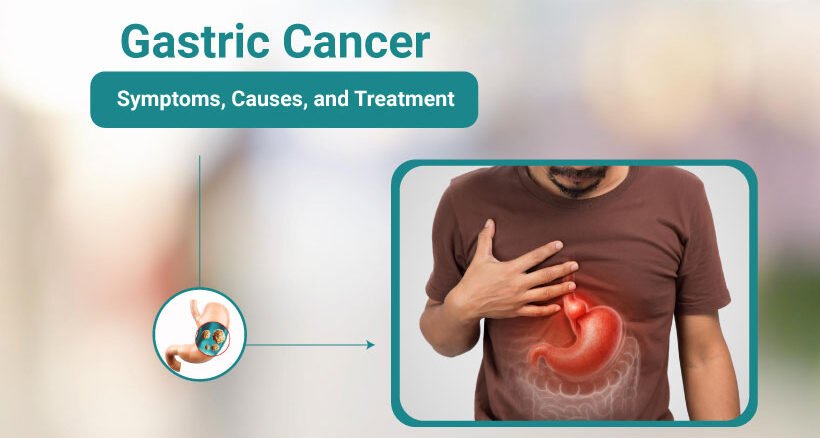Gastric cancer, also known as stomach cancer, is a disease that develops when abnormal cells in the stomach lining grow uncontrollably. While its global occurrence has decreased over the years, it remains one of the leading causes of cancer-related deaths. One of the main challenges with gastric cancer is that the early warning signs are often very subtle and can be mistaken for ordinary digestive problems. This makes awareness and timely medical attention extremely important.
In this blog, we will discuss the gastric cancer symptoms, the causes of gastric cancer, and the treatment options available today. By understanding these aspects, people can take preventive measures and recognise when it’s time to seek medical help.
What are the Symptoms of Gastric Cancer?
The symptoms of gastric cancer vary depending on the stage of the disease. In the early stages, the signs can be so mild that they are often overlooked. However, catching them early makes a huge difference in treatment success.
The most common gastric cancer symptoms include:
- Persistent indigestion, acid reflux, or heartburn
- Stomach discomfort or pain, especially after eating
- Bloating or feeling overly full even after a small meal
- Loss of appetite and difficulty enjoying food
- Unexplained and rapid weight loss
- Nausea and vomiting, sometimes with traces of blood
- Difficulty swallowing food in later stages
- Constant fatigue and weakness, often linked to anaemia
These symptoms are not unique to gastric cancer and may be caused by less serious issues like gastritis or ulcers. But if they continue for weeks or worsen over time, medical consultation is necessary. According to Dr. Satish Sharma, people should never ignore persistent digestive problems, as they may point to underlying conditions that need immediate attention.
What Causes Gastric Cancer?
There is no single cause of gastric cancer, but rather a combination of risk factors that contribute to its development. Some of these factors are linked to lifestyle habits, while others are related to genetic or environmental influences.
Major causes of gastric cancer include:
- Helicobacter pylori infection: This bacterial infection damages the protective lining of the stomach and increases the risk of ulcers and cancer.
- Unhealthy diet: Consuming large amounts of salty, smoked, or processed foods has been linked to a higher risk of stomach cancer. On the other hand, a diet rich in fruits, vegetables, and fibre can lower the risk.
- Smoking and alcohol use: Both habits not only harm the digestive tract but also increase the likelihood of developing cancer.
- Family history and genetics: People with a family history of gastric cancer may be more prone to the disease. Inherited genetic mutations can also play a role.
- Other stomach conditions: Chronic gastritis, stomach polyps, and pernicious anaemia are conditions associated with a higher risk.
- Age and gender: Gastric cancer is more common in people over the age of 50 and occurs slightly more often in men.
While these risk factors don’t guarantee that someone will develop stomach cancer, they highlight the importance of preventive care. Eating a balanced diet, maintaining a healthy lifestyle, and undergoing regular check-ups can help reduce the risk. As Dr. Satish Sharma notes, being aware of personal risk factors allows people to take proactive steps toward prevention.
What are the Treatment Options for Gastric Cancer?
The choice of gastric cancer treatment depends largely on the stage of the cancer, its location, and the patient’s overall health. Doctors may recommend one or a combination of treatments to ensure the best outcome.
- Surgery: Surgery is often the primary treatment, especially if cancer is detected early. The procedure may involve removing part of the stomach (subtotal gastrectomy) or the entire stomach (total gastrectomy) along with nearby lymph nodes. In some cases, minimally invasive laparoscopic techniques may be used.
- Chemotherapy: Chemotherapy uses drugs to kill cancer cells or stop them from growing. It may be used before surgery to shrink the tumour, after surgery to destroy remaining cancer cells, or in advanced cases to control disease progression.
- Radiation Therapy: This treatment uses high-energy beams to destroy cancer cells. It is often combined with chemotherapy to improve effectiveness.
- Targeted Therapy: Targeted drugs focus on specific proteins or genes involved in cancer cell growth. This treatment is especially useful in advanced gastric cancer when traditional therapies are less effective.
- Immunotherapy: Immunotherapy boosts the body’s natural defences to fight cancer. It is increasingly being used in patients with advanced or recurrent gastric cancer.
Every patient’s case is unique, so treatment must be tailored to individual needs. According to Dr. Satish Sharma, combining therapies often leads to better outcomes, especially when guided by a multidisciplinary medical team.
Living With Gastric Cancer
Beyond medical treatment, lifestyle and emotional support are equally important. Patients can improve their quality of life by:
- Eating smaller, nutrient-rich meals that are easier to digest
- Staying physically active with light exercises as recommended by doctors
- Avoiding smoking and alcohol to reduce complications
- Joining cancer support groups for emotional well-being
- Following up regularly with healthcare providers
A holistic approach that includes both medical treatment and lifestyle adjustments helps patients cope better with the disease.
Conclusion
Gastric cancer is a serious condition, but awareness and early action can make a life-changing difference. Recognising gastric cancer symptoms, knowing the causes of gastric cancer, and understanding the available gastric cancer treatment options can empower individuals to seek medical help at the right time.
As highlighted by Dr. Satish Sharma, early detection and personalised treatment plans significantly increase survival rates and help patients live longer, healthier lives. With proper awareness, preventive care, and medical guidance, it is possible to fight gastric cancer more effectively.

